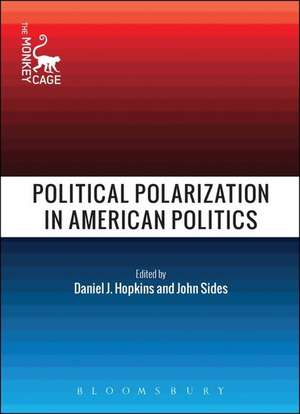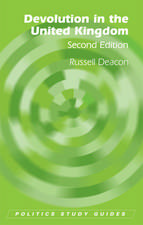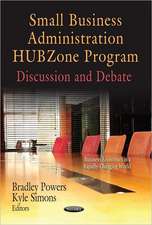Political Polarization in American Politics
Editat de John Sides, Daniel J. Hopkinsen Limba Engleză Paperback – 6 mai 2015
Preț: 111.80 lei
Preț vechi: 129.97 lei
-14% Nou
Puncte Express: 168
Preț estimativ în valută:
21.41€ • 22.29$ • 17.76£
21.41€ • 22.29$ • 17.76£
Carte tipărită la comandă
Livrare economică 14-28 februarie
Preluare comenzi: 021 569.72.76
Specificații
ISBN-13: 9781501306273
ISBN-10: 1501306278
Pagini: 192
Ilustrații: Graphs and Tables of statistical data
Dimensiuni: 121 x 165 x 15 mm
Greutate: 0.18 kg
Editura: Bloomsbury Publishing
Colecția Bloomsbury Academic
Locul publicării:New York, United States
ISBN-10: 1501306278
Pagini: 192
Ilustrații: Graphs and Tables of statistical data
Dimensiuni: 121 x 165 x 15 mm
Greutate: 0.18 kg
Editura: Bloomsbury Publishing
Colecția Bloomsbury Academic
Locul publicării:New York, United States
Caracteristici
Brand Cooperation: the book curates important articles from the widely-read The Monkey Cage Blog (Washington Post), to which the editors also contribute
Notă biografică
Daniel J. Hopkins is Associate Professor in the Department of Government at Georgetown University, USA. He contributes to The Monkey Cage and FiveThirtyEight.John Sides is Associate Professor in the Department of Political Science at George Washington University, USA. He is the co-author of The Gamble: Choice and Chance in the 2012 Presidential Election (2013). He contributes to The Monkey Cage.
Cuprins
PrefaceContributors1. What we know and don't know about our polarized politics-Nolan McCartyHow are we polarized?2. Partisan warfare is the problem-Sean Theriault3. How U.S. state legislatures are polarized and getting more polarized-Boris Shor4. Our politics is polarized on more issues than ever before-Thomas Carsey and Geoffrey Layman5. How politically moderate Americans? Less than it seems-Christopher Hare and Keith Poole6. Americans aren't polarized, just better sorted-Morris Fiorina and Samuel Abrams7. Are politicians and activists reliably 'more extreme' than voters? A skeptical perspective- David Broockman8. Party polarization is making us more prejudiced-Lilliana Mason9. Politics stops at the water's edge? Not recently-Robert LieberWhy are we polarized?10. The two key factors behind our polarized politics-Jeff Stonecash11. American politics is more competitive than ever, and that's making partisanship worse-Frances Lee12. How race and religion have polarized American voters-Alan Abramowitz13. How ideological activists constructed our polarized parties-Hans Noel14. How better educated whites are driving political polarization-Andrew Gelman15. Are Fox and MSNBC polarizing America?-Matthew Levendusky16. Why you shouldn't blame polarization on partisan news-Kevin Arceneaux17. The media make us think we're more polarized than we really are-Matthew Levendusky and Neil MalhotraPolarization Abroad18. Sure, Congress is polarized. But other legislatures are more so-David Brady19. Canada is polarizing-and it's because of the parties-Richard Johnston20. In Britain, polarization could be the solution-Rob FordWhat Can Be Done?21. Our politics may be polarized, but that's nothing new-David Brady and Hahrie Hahn22. Polarization in Congress has risen sharply. Where is it going next?-Christopher Hare, Keith Poole, and Howard Rosenthal23. Can young voters break the cycle of polarization?-Robert Shapiro24. How to fix our polarized politics? Strengthen political parties-Richard Pildes25. Our political parties are network, not fragmented-Seth Masket26. Gridlock is bad. The alternative is worse-Morris Fiorina
Recenzii
This is a superb volume of thoughtful and wide-ranging essays on polarization by some of the best scholars in the political science field. If you want to learn about the causes, effects, and consequences of polarization in American politics and society, this should be your go-to source.
This collection of short essays is easily the broadest and most accessible treatment of polarization available. Drawing on the work of dozens of distinguished scholars, this collection covers whether we are polarized at mass and elite levels, why we are polarized, and what might be done about it. Dispensing with technical jargon, the authors make their cases briefly and succinctly without sacrificing the complexity of the issue. This would be an excellent volume to use for stimulating discussion in an undergraduate class on public opinion and American politics.
Hopkins and Sides have assembled an outstanding collection of concise and accessible essays that lay out the latest research on the facts, origins, and potential solutions regarding polarization in American politics. This book is an excellent resource for students, teachers, and anyone interested in understanding polarization from the country's leading experts.
Fans of the Monkey Cage will be indebted to Daniel Hopkins and John Sides for this timely volume of essays about the extent, origins and causes of polarization between Democrats and Republicans in contemporary American politics. The short, accessible pieces by some of the nation's most distinguished scholars will prove invaluable to journalists and professors looking for concise, trenchant materials about America's troubled party system. Students, especially, will benefit from seeing how skillful empirical analysis illuminates or contradicts widely held beliefs about partisan politics.
This collection of short essays is easily the broadest and most accessible treatment of polarization available. Drawing on the work of dozens of distinguished scholars, this collection covers whether we are polarized at mass and elite levels, why we are polarized, and what might be done about it. Dispensing with technical jargon, the authors make their cases briefly and succinctly without sacrificing the complexity of the issue. This would be an excellent volume to use for stimulating discussion in an undergraduate class on public opinion and American politics.
Hopkins and Sides have assembled an outstanding collection of concise and accessible essays that lay out the latest research on the facts, origins, and potential solutions regarding polarization in American politics. This book is an excellent resource for students, teachers, and anyone interested in understanding polarization from the country's leading experts.
Fans of the Monkey Cage will be indebted to Daniel Hopkins and John Sides for this timely volume of essays about the extent, origins and causes of polarization between Democrats and Republicans in contemporary American politics. The short, accessible pieces by some of the nation's most distinguished scholars will prove invaluable to journalists and professors looking for concise, trenchant materials about America's troubled party system. Students, especially, will benefit from seeing how skillful empirical analysis illuminates or contradicts widely held beliefs about partisan politics.












